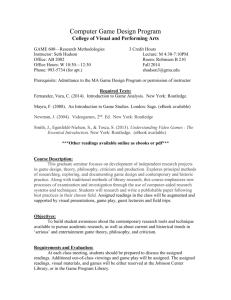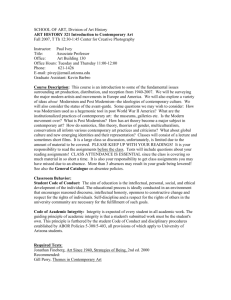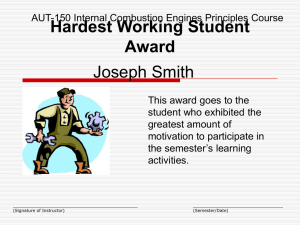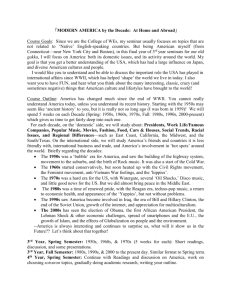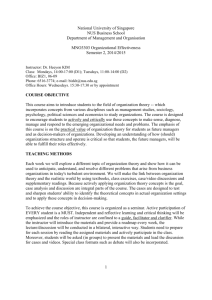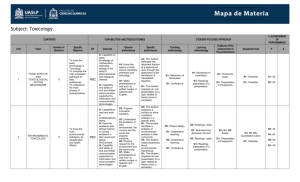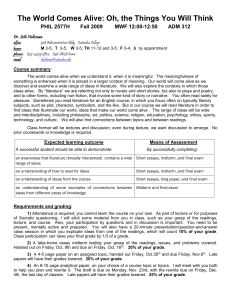NATIONAL UNIVERSITY OF SINGAPORE
advertisement
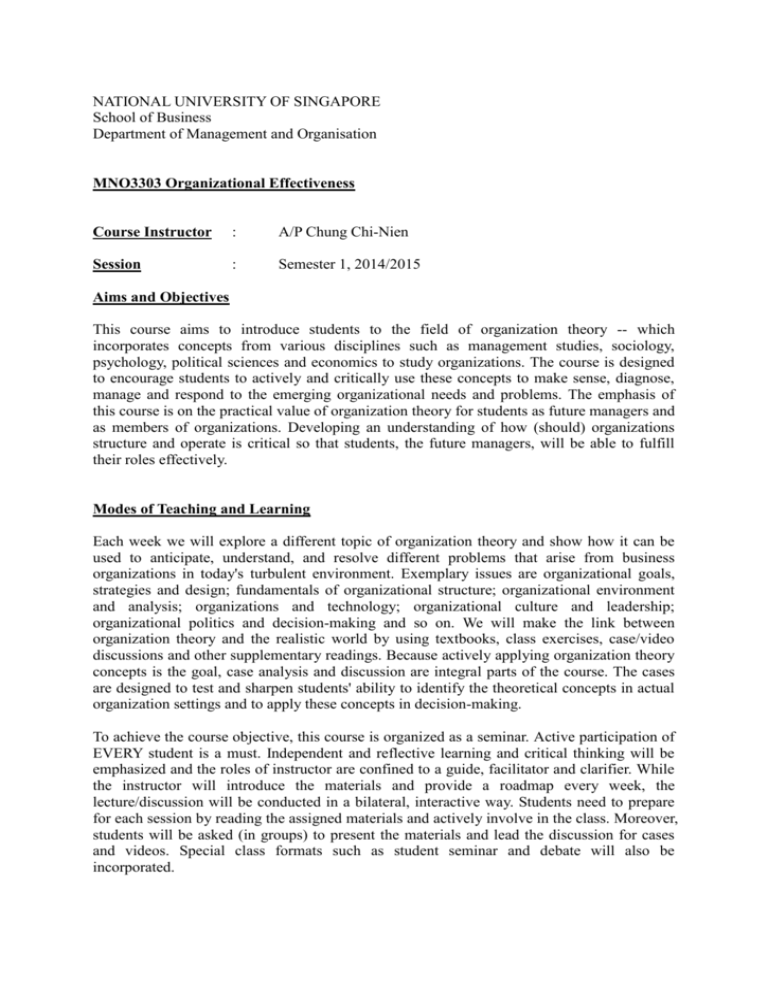
NATIONAL UNIVERSITY OF SINGAPORE School of Business Department of Management and Organisation MNO3303 Organizational Effectiveness Course Instructor : A/P Chung Chi-Nien Session : Semester 1, 2014/2015 Aims and Objectives This course aims to introduce students to the field of organization theory -- which incorporates concepts from various disciplines such as management studies, sociology, psychology, political sciences and economics to study organizations. The course is designed to encourage students to actively and critically use these concepts to make sense, diagnose, manage and respond to the emerging organizational needs and problems. The emphasis of this course is on the practical value of organization theory for students as future managers and as members of organizations. Developing an understanding of how (should) organizations structure and operate is critical so that students, the future managers, will be able to fulfill their roles effectively. Modes of Teaching and Learning Each week we will explore a different topic of organization theory and show how it can be used to anticipate, understand, and resolve different problems that arise from business organizations in today's turbulent environment. Exemplary issues are organizational goals, strategies and design; fundamentals of organizational structure; organizational environment and analysis; organizations and technology; organizational culture and leadership; organizational politics and decision-making and so on. We will make the link between organization theory and the realistic world by using textbooks, class exercises, case/video discussions and other supplementary readings. Because actively applying organization theory concepts is the goal, case analysis and discussion are integral parts of the course. The cases are designed to test and sharpen students' ability to identify the theoretical concepts in actual organization settings and to apply these concepts in decision-making. To achieve the course objective, this course is organized as a seminar. Active participation of EVERY student is a must. Independent and reflective learning and critical thinking will be emphasized and the roles of instructor are confined to a guide, facilitator and clarifier. While the instructor will introduce the materials and provide a roadmap every week, the lecture/discussion will be conducted in a bilateral, interactive way. Students need to prepare for each session by reading the assigned materials and actively involve in the class. Moreover, students will be asked (in groups) to present the materials and lead the discussion for cases and videos. Special class formats such as student seminar and debate will also be incorporated. Basic Text and Readings There is only one text for this course which the schedule and lectures follow. Students are encouraged to read the supplementary readings that provide a guide to go deeper into a specific subject. These are classics in the respective areas and are very interesting. Extra credits will be given for incorporating these sources into group project, case presentation and final exam. On top of the textbook and the supplementary readings, there are also cases and short essays from various sources such as Business Week, Economist, Fortune, and Wall Street Journal. (1) Organization Theory and Design by Richard L. Daft. (2) Supplementary readings in various management journals Course Policies Students are accountable for their class attendance behavior. If you know you will be absent from class, I expect you to notify me in advance or, in the case of an emergency, as soon as possible afterward. Medical or other certificates are necessary for a legitimate absence. If you miss one whole class without valid reasons, ONE point will be deducted from your total final participation grade at the end of the semester. Moreover, HALF point will be deducted if you are late for an hour and leave an hour earlier. Other policies are abided by the university rules. Methods of Assessment (subject to change) Your grade will be determined by your performance on the midterm exam, a group project, 1 class presentation, and attendance & participation. The percentage of your grade accounted for by each of these components is listed below, as is a description of each. Midterm Exam: Group Project: Class Presentation: Att.& Participation: 25% 20% (Presentation only) 30% (Case 15% and Debate 15%) 25% Midterm Exam: This would be a closed-book exam in the middle of the semester. It usually includes MCQ and short essay questions. The exam questions cover the textbook, the assigned cases and essays, and the content of our class discussions. The date for the exam is listed in the course schedule. The format is subject to change. Group Project You will be required to form groups of 3-4 people to work on your final project. Groups will be required to analyze a problem or situation currently faced by a prominent business organization using concepts discussed in class. The project is due the last week of the semester. Detailed directions for this project will be described later. All group members will receive the same grade for the project (and class presentations). However, each student is required to evaluate the contributions of his or her group members to the group efforts (group project & class presentation) using a form that will be handed out in class. Individual grades may then be adjusted based on peer evaluations. Class Presentation The same group for final project will also be asked to present the assigned cases/essays/video once during the semester. Each group should prepare a 30-40 minutes presentation in PowerPoint format, outlining the background and main issues, identifying potential agenda and discussing the questions. Grading on this presentation will weigh less on the way you dress or the way you create the PowerPoint slides, but more on how you comprehend, organize and incorporate the materials; more importantly, how you link the materials to the theoretical concepts discussed in class. Secondly, the 25% assessment grade will also depend on how you facilitate the discussion. The more your fellow classmates participate in the discussion, the better your grade is (but please do not bribe your classmates). I will provide some discussion questions for each assigned case but you are STRONGLY ENCOURAGED to add in your own issues. This demonstrates how well you comprehend the materials and your independent/critical thinking about the subject. Finally, please prepare a printout of your PowerPoint slides for me before your presentation, so that I can take note on it. After the presentation, you also need to hand in your PowerPoint file, either in a disk or as an email attachment.


